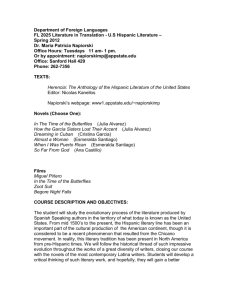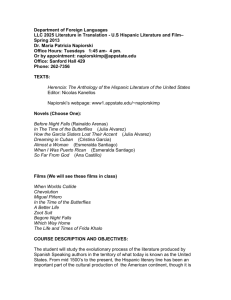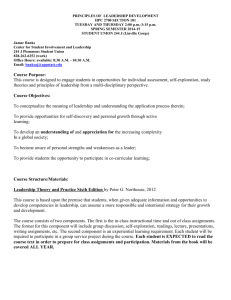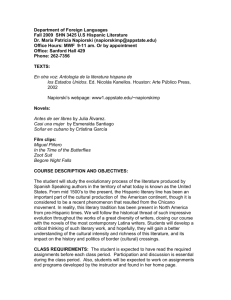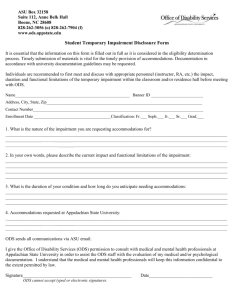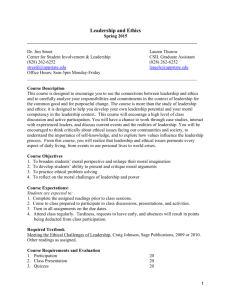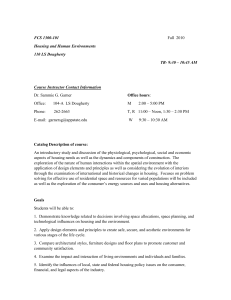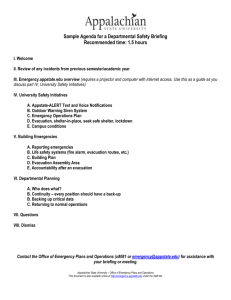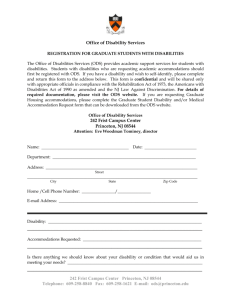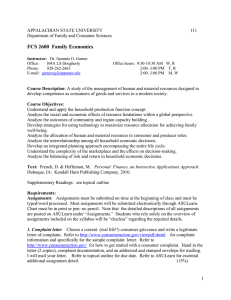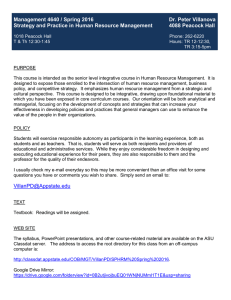BE3340106091 - Syllabi - Appalachian State University
advertisement
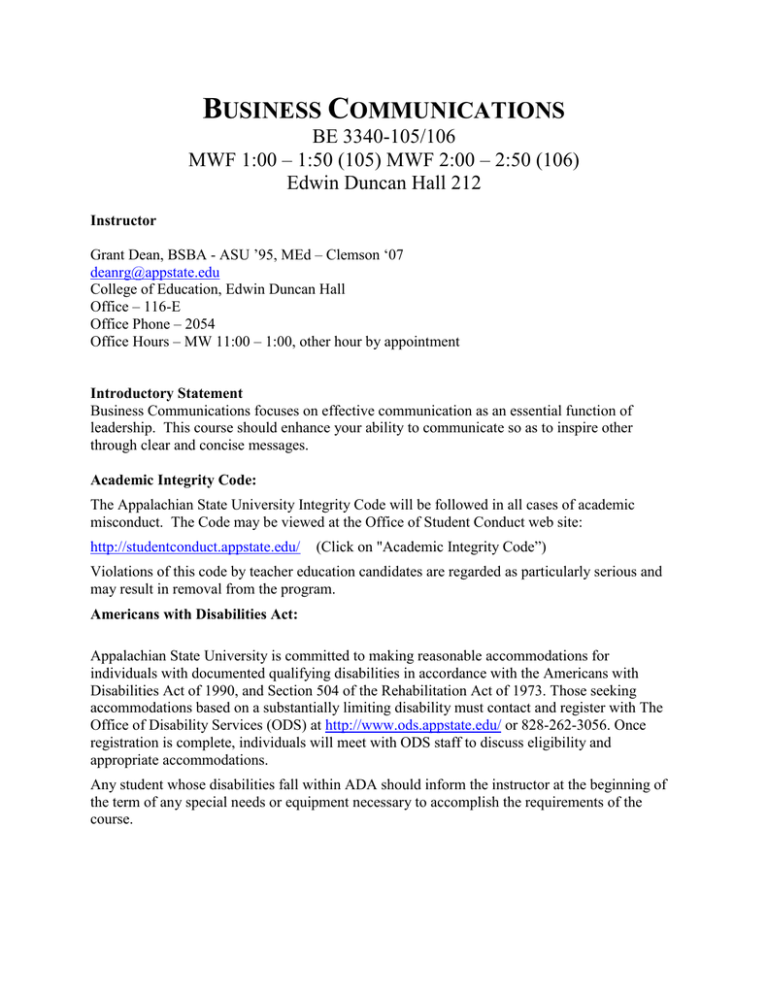
BUSINESS COMMUNICATIONS BE 3340-105/106 MWF 1:00 – 1:50 (105) MWF 2:00 – 2:50 (106) Edwin Duncan Hall 212 Instructor Grant Dean, BSBA - ASU ’95, MEd – Clemson ‘07 deanrg@appstate.edu College of Education, Edwin Duncan Hall Office – 116-E Office Phone – 2054 Office Hours – MW 11:00 – 1:00, other hour by appointment Introductory Statement Business Communications focuses on effective communication as an essential function of leadership. This course should enhance your ability to communicate so as to inspire other through clear and concise messages. Academic Integrity Code: The Appalachian State University Integrity Code will be followed in all cases of academic misconduct. The Code may be viewed at the Office of Student Conduct web site: http://studentconduct.appstate.edu/ (Click on "Academic Integrity Code”) Violations of this code by teacher education candidates are regarded as particularly serious and may result in removal from the program. Americans with Disabilities Act: Appalachian State University is committed to making reasonable accommodations for individuals with documented qualifying disabilities in accordance with the Americans with Disabilities Act of 1990, and Section 504 of the Rehabilitation Act of 1973. Those seeking accommodations based on a substantially limiting disability must contact and register with The Office of Disability Services (ODS) at http://www.ods.appstate.edu/ or 828-262-3056. Once registration is complete, individuals will meet with ODS staff to discuss eligibility and appropriate accommodations. Any student whose disabilities fall within ADA should inform the instructor at the beginning of the term of any special needs or equipment necessary to accomplish the requirements of the course. Course Description Students will gain experience in written and spoken business communications. The will be through typical and non-typical activities such as; writing e-mail, memoranda, letters, proposals, reports. Others may be added at the appropriate time. (WRITING; SPEAKING) Objectives Upon completing of this course, students will be able to: Competently complete written and oral business communication projects Exhibit professional, efficient work habits in using communication systems Articulate current issues in interpersonal, global and intercultural communication Integrate current skills with new skills in business or education Teaching Philosophy I have taught High School Business for 10 years in three states. This has afforded me a great deal of exposure to both effective and ineffective communication. This experience will be a key to this course as I try to focus its direction in ways that will have an impact on your future careers. The most basic desired outcome of this course should be to improve your ability to communicate effectively with a diverse audience. The class atmosphere will be relaxed but professional. I will be challenging you to produce your best, and in return I also will be challenged. Communication will be a key component for this to occur. This course will be made up of a variety of activities and projects. ASULearn will be used to improve the communication for the course as well as distribute information. Class time will be productive and planned to move everyone toward the ultimate goals of improved communication. Texbook: Bovee, Business Communication Today, 9th Ed, ISBN: 0131995359 Potential Course Topics Understanding the foundations of business communication The three-step writing process Business Documents (letters, memos, e-mails, instant messaging) Finding and Communication Information Oral Presentation (designing and delivering) Employment communication and interviewing Calendar/Important Dates Jan 19th March 9-13 Feb 4-8 MLK – No Classes Spring Break AMTE Conference April 13-14 April 30 May 1-6 No Classes Reading Day Final Exams Course Requirements All assignments will be posted on ASULearn. You will need to check this almost daily to stay current for the assignments and class meeting schedule. The basic course content will include: Outside Reading (textbook, newspapers, etc) Case Studies and Writings Presentation Quizzes and Exams Attendance Policy It is the student’s responsibility to sign in for all classes. Signing in for another student not in attendance will constitute an act of academic dishonesty. This includes class sessions that might be held online. Learning is a social process. Thus, students are expected to attend every class and be an active participant in the classroom practices. Absent students are responsible for any work announced in class and for all announced changes, additions, and deletions to the syllabus. Absence from class is not a valid excuse for failing to meet deadlines or fulfill course requirements. Attendance is one of the first things I consider when determining a grade change at the end of the semester. Grading Quizzes........................... 40% Class Work ..................... 40% Group Grade................... 10% Final Exam ..................... 10% Grading Scale: A = 94 – 100 A- = 90 – 93 B+ = 87 – 89 B = 83 – 86 B- = 80 – 82 C+ = 78 – 79 C = 76 – 77 C- = 74 – 75 D = 69 – 73 F = ↓ 69 Academic Dishonesty The University Integrity Code is mentioned earlier in this syllabus. The basic guideline for this course is to create individual and/or unique solutions to the problems posed. Providing assistance to classmates with things like basic computer skills is not only expected but encouraged. Participation in class is expected and some of that discussion may be present in completed work. “Working together” on individual assignments is not permitted. This included different groups “working together” on group projects. For group projects and assignments only group members may collaborate. Family Educational Rights and Privacy Act (FERPA) FERPA gives parents certain rights with respect to their children's education records. These rights transfer to the student when he or she reaches the age of 18 or attends a school beyond the high school level. Students to whom the rights have transferred are "eligible students." (20 U.S.C. § 1232g; 34 CFR Part 99) Generally, schools must have written permission from the parent or eligible student in order to release any information from a student's education record. However, FERPA allows schools to disclose those records, without consent, to the following parties or under the following conditions (34 CFR § 99.31): School officials with legitimate educational interest; Other schools to which a student is transferring; Specified officials for audit or evaluation purposes; Appropriate parties in connection with financial aid to a student; Organizations conducting certain studies for or on behalf of the school; Accrediting organizations; To comply with a judicial order or lawfully issued subpoena; Appropriate officials in cases of health and safety emergencies; and State and local authorities, within a juvenile justice system, pursuant to specific State law. DON’T WAIT UNTIL IT’S TOO LATE! Help will be provided as is most convenient for everyone involved. I live on campus (LLR 203) and can be available to meet at most any time and usually on short notice. Email is usually the best way to get in touch with me (deanrg@appstate.edu). Early and frequent contact with me is the best way to prevent small issues from becoming the things that prevent your success in the course.
